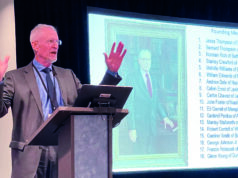
Dear Epic,
I am not writing to you today as a customer, but rather on behalf of your users. More specifically, I am representative of the 870 American Medical Association (AMA) physicians who gave their electronic health record (EHR) an average grade of F on a recent survey published in the Mayo Clinic Proceedings.1 I also represent 72% of the 860 vascular surgeons I queried who reported being unsatisfied with their EHR.2 In fact, if you review nearly any recent study of physicians and their relationship to their EHR, you will see that I represent the overwhelming majority. We are not happy, and we would like change.
There are two reasons why I am writing my comments to Epic directly and not to the EHR industry as a whole. First, it seems we are stuck with each other. Epic is used by nearly every major medical institution. More than half of the U.S. population have their medical records on an Epic system. Epic’s massive market share and the closed nature of its system mean that your programmers essentially set the standard for EHR usability. For better or for worse. Second, I am concerned about recent comments made by Epic executives regarding physician burnout. While most EHR companies are happy to stick their heads in the sand or offer useless platitudes toward the blight of physician burnout, I believe you have taken it one step further. Epic’s leadership appears to outright deny the established correlation between the EHR and burnout.
In an interview with Healthcare IT News,3 CEO of Epic Systems, Judith Faulkner, stated: “Here is something I wish the press would do. And that is, the latest studies I’ve seen are showing that there’s not a high correlation between happiness with the EHR and happiness with their job and the problem of burnout. I think it would really help if the media understands that and helps everyone else know it.” I honestly don’t know what this statement even means. It seems like Ms. Faulkner is asserting that while doctors may hate Epic, they also hate their jobs, so maybe the two are unrelated?
I have no idea if Ms. Faulkner truly believes her statement, but if Epic’s corporate policy is that the EHR is unrelated to burnout, then we have a problem. The science connecting the EHR to burnout is not only overwhelming, it is also logical. Major triggers to burnout are barriers to doing your job. Doctors want to care for patients. Unfortunately, that now means we must spend countless hours on the computer, far more than we spent on paper charts. All EHR vendors must immediately look for steps that can be taken to decrease the time physicians devote to using their products to care for patients.
Statistics
The easiest way to defend a product’s role in causing harm is to deny the very relationship. Blur the lines. As doctors, we have seen this tactic time and time again. Cigarette maker Philip Morris nearly perfected it. Statistics can always be used to sell doubt. Outlier studies are frequently deployed to prevent consensus because consensus demands action. Sir Ronald Fisher, the father of modern medical statistics, devoted his dying years arguing that cigarettes didn’t cause lung cancer. Rather, he opined, lung cancer patients developed a craving for cigarettes to soothe the irritation in their lungs.
I am concerned about the role physician wellness has played in Epic’s decision-making over the last decade. Interoperability has been an abject failure of the EHR era. Physicians were promised seamless communication between offices and hospitals. Our patients’ records available everywhere at our fingertips. Four years after my hospital converted to Epic, we still cannot integrate our office notes. While it’s fun to stand at our fax machine pretending to be Don Draper sending a hot new ad copy to Lucky Strike headquarters, there has to be a better way.
On Sept. 15, 2008, Rep. Pete Stark (D-CA) introduced HR 6898, which could have provided an open-source health IT system for the entire country. Everyone on a single free EHR with third-party app developers able to innovate at will. The EHR industry helped to kill this effort with lobbyists and money. In its place, the HITECH Act passed in 2009, further fracturing our healthcare system. Epic’s CEO was appointed to the U.S. Health IT Policy Committee, which then pushed for rapid implementation of the law. Suddenly, it seemed every hospital and physician’s office needed an electronic health system. As the entire U.S. healthcare system rushed to become compliant, Epic offered something few could. An all-in-one package. Epic’s comprehensive nature was an easy sell to hospital CEOs who were overwhelmed by the new federal regulations. In my opinion, the key to Epic’s massive market share lies in the all-encompassing nature of its software suite and not necessarily in its quality.
Seemingly no company has fought the promise of interoperability more than Epic. In 2013, the CommonWell Health Alliance was formed to ease information exchange between EHRs. This non-profit association consisted of 28 members, but Epic declined to join. Instead, you created an interoperability network for hospitals, but only if all of the hospitals used Epic. In a statement to the U.S. Senate,4 Epic’s director of interoperability, Peter DeVault, defended these actions. He stated that Epic users could link with non-users but admittedly only through a possibly lengthy process where the systems were linked manually by Epic, for an hourly fee and a per-patient surcharge. Due to outside pressure, Epic later suspended the per-patient cost. A 2014 RAND report5 named Epic a singular roadblock to interoperability.
Privacy
In 2019, Epic again came out against interoperability. Your CEO’s letter6 to health system executives asked them to contact Alex Azar, then Health and Human Services (HHS) secretary, and oppose two proposed rulings designed to give patients increased access to their health records. Privacy concerns were cited as the primary motivation. Seema Verma, Centers for Medicare & Medicaid Services (CMS) administrator, later responded, “The disingenuous efforts by certain private actors to use privacy, as vital as it is, as a pretext for holding patient data hostage is an embarrassment to the industry.”
While Epic’s stated goal was to protect patient privacy, I suspect your motives were fiscal. Tommy Thompson, former HHS secretary and Wisconsin governor, seems to agree with me. In his editorial defending Epic,7 he wrote, “These rules would unfairly harm Wisconsin’s health IT industry and, along with it, the Wisconsin economy. These rules would compel Epic to give its trade secrets away to venture capitalists, Big Tech, Silicon Valley interests, and overseas competitors for little or no compensation.” It is not a crime to protect your profits; some would say that is the point of being in business. Those of us in the healthcare field, however, have to learn to balance financial priorities with the greater good.
Perhaps Epic has gotten too big. The company is now involved in far more than EHR development. It runs the EpicShare platform, the Boost consulting service, and the data mining research service Cosmos. Epic also offers public health surveillance, benchmarking for healthcare systems, and numerous resources for hospital CEOs and insurance companies. Of course, all of these function with proprietary access to patient data. And the larger and more exclusive that database is, the better. So while Epic has admirably refrained from selling patient data to outside businesses, in reality, it seems you can profit from it all on your own.
I believe no aspect of the EHR contributes more to burnout than the pure amount of time it requires of doctors. A 2019 JAMA study8 found that interns were spending more than 10 hours per day on electronic records. The study gained a lot of attention, and I’m sure it didn’t go unnoticed by Epic. Your software can now track physicians’ time. Surprisingly though, data acquired through Epic tells a dramatically different story. In one recent study,9 Epic reported U.S. physicians were spending about 90 minutes per day on electronic records. A far more reasonable number, although it comes with a catch. Epic only records physicians’ time interacting with the EHR if they click the mouse or perform a keystroke every 5 seconds. Otherwise, you simply stop the clock. My kids wish the screen time parental controls on their devices were this forgiving.
Epic costs
EHR vendors often argue that physician dissatisfaction with their product is really just frustration with U.S. government regulations. So what happens when an EHR is deployed in another country? Denmark has a national health system and high levels of physician satisfaction. A recent Epic rollout in a large region of the country left mixed reviews at best. A poll of their physicians found only 12% were satisfied with the new EHR, while 60% reported deep dissatisfaction.10 Henrik Flyger, MD, a premier breast surgeon, lamented, “You have exported burnout.”
Epic can also be very expensive to initiate. Mayo Clinic and Partners HealthCare spent more than $1 billion each on Epic implementation, according to reports. Kaiser Permanente spent $4 billion. A Peer60 survey11 showed that Epic also had significantly higher down-the-road costs than either Cerner or Allscripts, competitor EHR firms. Not every hospital can afford these top-level installations, but CEOs are terrified of picking the wrong EHR. A common saying in the industry is that no one is ever fired for choosing Epic. Therefore, many hospitals end up purchasing inferior versions with less support. And their physicians suffer. I’m sure you know that ease of use and level of support can reduce physician stress. But this process is now monetized. So congratulations to those physicians who work at an institution that can afford top-level support and software. Thoughts and prayers to the rest of us.
In describing your efforts to improve the physician experience, Epic often cites the specialty boards12 that you set up to interact with doctors directly. I spoke with several members of your Vascular Surgery Surgical Steering Board. They all relayed frustration with the process of improving the Epic interface for vascular surgeons. I have provided them anonymity so as not damage their relationship with your company. I began by asking them about compensation for their time.
One told me, “We have never been offered reimbursement for our time or ideas.” Another added: “No. You’re basically a free software developer for them.” When asked about the process of improving the software, I was told, “Vascular was an afterthought for Epic and it shows in how poorly integrated our workflows are.” “The process is very slow and laborious. [I] could not get them to figure out how to mitigate the click-to-death nature of EMR [electronic medical record].” Another highlighted the hierarchal nature of Epic implementations. “I can see other institutions that have made the investment in bettering the lives of their physicians with the updates, specializations, order sets, templates, etc…. then I see my version and it magnifies everything that it lacks.”
Epic reply
In preparing this letter, I wrote to Epic and submitted the above remarks from the Epic Vascular Surgery Steering Board and also asked for Epic’s comment on Judith Faulkner’s assertion denying the association between the EHR and physician burnout. Here is the complete statement I received from Epic’s vice president of clinical informatics, Chris Mast, MD:
“We work closely with our customers to develop software that saves physicians time and adapts to their preferred practice styles. Ideas and input from physicians have always been integral to the design process, whether from steering boards of specialists or from developers meeting with physicians. Mobile apps, speech-driven workflows, and a built-in virtual assistant give physicians more control over how they interact with the system and quicker access to information.
“This helps healthcare organizations address key causes of physician burnout, according to independent research. In 2020, for example, a Medscape survey of 12,000+ physicians found that the three most common contributing factors to burnout were too many bureaucratic tasks (58%); spending too many hours at work (37%); and lack of respect from leaders or colleagues (37%). EHRs were sixth on the list.
“The EHR offers benefits that are not possible with paper-based records—like engaging patients through convenient web apps and offering widespread virtual care during the COVID-19 pandemic. Regulatory requirements also have a major effect on physician satisfaction.
“Just imagine trying to keep up in today’s regulatory climate without an EHR. Physicians would be buried in paper documentation and expected to search through charts and follow up on illegible or inaccessible information. EHRs allow organizations to automate or streamline many regulatory tasks and adapt quickly when regulations change.”
To be honest, I found this response to be outrageous. Ignoring the dozens of peer-reviewed studies13 that link the EHR to burnout, and presenting this flawed survey as evidence of the opposite is shameful. I believe the kids call this gaslighting. You have cherrypicked the Medscape survey from a pandemic year when doctors had quite a bit on their plates. If you check the same survey report from 2019 (and I suspect you did), you would see EHR sitting right at #3, just two percentage points behind “spending too many hours at work.”
Looking back through these annual Medscape surveys, the EHR is perennially in the top three to four reported causes of burnout. In fact, the authors concluded,14 “Many factors can cause burnout, but by far, having too many administrative tasks as well as working long hours, working with EHRs, lack of respect and insufficient compensation are major players.” And since when is being the sixth-worst thing in medicine good? If I were voted the sixth-worst doctor, my first response wouldn’t be to gloat over Drs. Doom, Strangelove, Octopus, Frankenstein and Lector.
Devaluation
Why am I asking you for accountability? Healthcare finances are a zero-sum game. Epic generates billions of dollars from this system. I know you are investing in artificial intelligence and other technologies that may decrease physician workload. But these are just future innovations that will take years to implement into newer versions of Epic.
The reality is we need you to focus effort and financing now to improve the existing interface and levels of support. I feel that you have displayed a consistent pattern of devaluing physicians. Over the past decade, Epic has seemingly resisted true interoperability, monetized support for nurses and doctors, distorted physician EHR time requirements, limited third-party innovations, and denied the science behind the role of EHR in burnout. The doctors who want to help and serve on your steering boards go uncompensated—another indicator of the worth you place on physicians.
In an interview with Stephen Klasko, MD, the editor-in-chief of Healthcare Transformation, your CEO Judith Faulkner said, “We have too many doctors who no longer like their professions.”15 I completely disagree. We don’t hate our jobs. We hate the barriers to doing our jobs. Your corporate motto has been reported16 as “Do good. Have fun. Make money.” While this might not have the same zing as Cobra Kai’s “Strike first. Strike hard. No mercy,” at least it’s honest and to the point. I can’t speak to the money you’ve made or the fun you’ve had, but I know there is plenty of good left to do.
Look Epic, I know you’re not going anywhere, but neither are we. Put aside the science denial and join us at the table. Not through the steering committees under your control, but via high-level, bilateral negotiations. The EHR usability metrics17 published last year by Christine Sinsky, MD, and colleagues would be an excellent place to start. I sincerely hope you begin to accept the role of the EHR in burnout and work with us. If not, at least I’ve put something in your inbox for once.
Yours truly,

Malachi Sheahan III, MD, is the Claude C. Craighead Jr. professor and chair in the division of vascular and endovascular surgery at Louisiana State University Health Sciences Center in New Orleans. He is the medical editor of Vascular Specialist.
References
- Edward R. Melnick, Liselotte N. Dyrbye, Christine A. Sinsky, Mickey Trockel, Colin P. West, Laurence Nedelec, Michael A. Tutty, Tait Shanafelt. The Association Between Perceived Electronic Health Record Usability and Professional Burnout Among U.S. Physicians. Mayo Clinic Proceedings, Volume 95 Issue 3, 2020.
- D.M. Coleman, S.R. Money, A.J. Meltzer, M. Wohlauer, L.M. Drudi, J.A. Freischlag, M.S. Hallbeck, B. Halloran, T.S. Huber, T. Shanafelt, M. Sheahan, Vascular Surgeon Wellness and Burnout: A Report from the SVS Wellness Task Force, Journal of Vascular Surgery, 2020.
- https://www.healthcareitnews.com/news/epic-ceo-judy-faulkner-apple-docs-who-actually-their-ehrs-and-warren-buffett
- https://www.help.senate.gov/imo/media/doc/DeVault1.pdf
- https://www.rand.org/content/dam/rand/pubs/research_ reports/RR300/RR308/RAND_RR308.casestudies.pdf
- https://www.cnbc.com/2020/01/22/epic-ceo-sends-letter-urging-hospitals-to-oppose-hhs-data-sharing-rule.html
- https://madison.com/wsj/opinion/column/tommy-thompson-hhs-new-health-it-rule-would-hurt-epic-and-wisconsins-economy/article_bb2a6ff2-2b4b-5148-a774-f763d0b8969f.html
- Chaiyachati K.H., Shea J.A., Asch D.A., et al. Assessment of Inpatient Time Allocation Among First-Year Internal Medicine Residents Using Time-Motion Observations. JAMA Intern Med. 2019;179(6):760–767.
- Holmgren A.J., Downing N.L., Bates D.W., et al. Assessment of Electronic Health Record Use Between U.S. and Non-U.S. Health Systems. JAMA Intern Med. 2021;181(2):251–259.
- https://www.politico.com/story/2019/06/06/epic-denmark-health-1510223
- https://www.reactiondata.com/wp-content/uploads/2015/01/Peer60TCO-online.pdf
- https://www.epic.com/epic/post/specialty-steering-boards-improve-quality-on-a-global-scale
- Gabriela Velazquez, London C. Guidry and Amit Chawla. Settled science: The indisputable link between EHR and burnout. Vascular Specialist, Vol 17, No. 4, April 2021.
- https://www.medscape.com/slideshow/2019-lifestyle-burnout-depression-6011056#5
- https://www.liebertpub.com/doi/ full/10.1089/heat.2016.29026.jfa
- https://www.forbes.com/sites/katiejennings/2021/04/08/ billionaire-judy-faulkner-epic-systems
- Christine A Sinsky, Adam Rule, Genna Cohen, Brian G Arndt, Tait D Shanafelt, Christopher D Sharp, Sally L Baxter, Ming Tai-Seale, Sherry Yan, You Chen, Julia Adler-Milstein, Michelle Hribar, Metrics for assessing physician activity using electronic health record log data, Journal of the American Medical Informatics Association, Volume 27, Issue 4, April 2020.













Great letter. I hope this is shared by many!
I hate Epic. I’ve never even used it and I hate it. Epic has done more to lock talented, qualified IT professionals out of the market with their ham-fisted exclusivity.
You want to work for us? Have Epic experience. Don’t have Epic experience? Get training. How doyou get Epic training? Get a job at a medical facility that uses Epic. You want to work for that organization? Have Epic experience. Repeat ad nauseum.
Epic has created a catch-22 that assures failure for all but a chosen few. It makes me depressed as a medical IT worker.